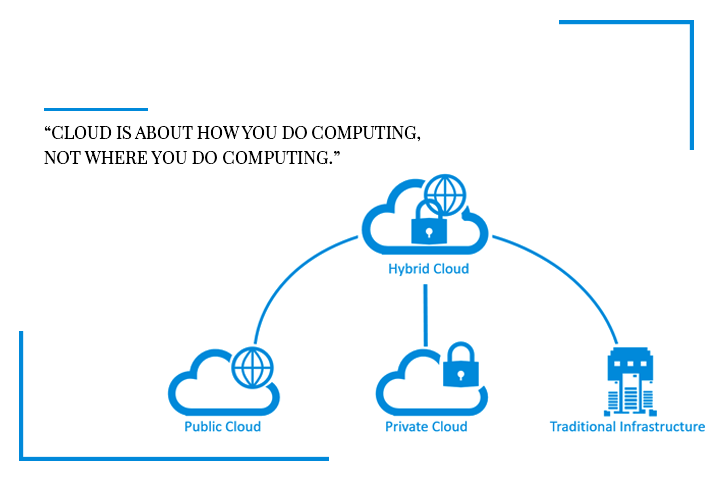
With extensive improvements going on in the IT world, especially with the ones driven by cloud, it’s more or less only a matter of choice on how far an enterprise can go to shape up their business processes to set in tune with existing technologies. Today when the use of cloud service has become indispensable for the enterprise world, companies are keen to explore various possibilities of hybrid cloud models to attain and maintain a competitive edge.
Because the primary goal of modern-day cloud solutions is to create and promote business efficiencies, decision-makers are willing to go big on cloud prospects and achieve better business feats with it. Like most technological facets, “cloud” as a service has also evolved in commercial terms. Earlier, it was restricted as remote access for IT resources, and today it has transformed into a categorical subscription model. It now holds the business reins as a highly complicated resource orchestration model which need not necessarily be allotted from the same part of a particular server.
Hybrid Hoard
Hybrid cloud basically combines the profitable efficiency of a private cloud with the all-around flexibility of a public cloud. It is a subset of both but typically without their respective shortcomings. Enterprises find modern-day hybrid cloud models to be highly effective because of a variety of practical reasons. The foremost being its flexibility with every work model and scope for facilitating innovation. Hybrid clouds are mainly designed to improve the operational efficiencies of businesses by enabling them to meet customer expectations quickly. It is inherently low on investment grounds, and one of the most in-demand enterprises means to optimize work processes and functional productivity.
Work Model

With hybrid cloud taking up the front rank in the enterprise world, businesses can steadily make their move towards the technological edge. Hybrid cloud has majorly changed the way companies operated by letting them make use of network ubiquity to play on with desired work resources. Now, cloud service providers need not stick around with centralized server systems across a single data center to provide requested services. With strong connectivity means, service providers can quickly fix up and distribute computing, data storage, and networking resources according to the client’s need. Here, concepts like containerization and resource virtualization come into play which also provides significant addition in the functional efficiency of a hybrid cloud. It is essentially a virtual data center created and backed by multiple service hosts from various locations but visualized and managed as a single unit like mainstream cloud servers.
Hybrid Cloud: Challenges
Hybrid cloud allows a company to merge its privately-owned services with public cloud resource to gain that extra bit of flexibility which private cloud models lack. Hybrid clouds bring great value into a specified work model and help companies deliver results at a much faster and competent pace. However, with all its top-level user benefits hybrid cloud also brings about a few technical and managerial challenges which companies often fail to realize. As stated before, the hybrid model is an intelligent unification of private and public cloud resources and therefore needs strong API front and network connectivity to deliver output. Although the private cloud part of the hybrid architecture stands firm with its serviceability and work model, companies might find public clouds to be a bit off the mark due to its distinctive openness. Public clouds are more prone to violation of service level agreement breaches, service disruptions and frequent connectivity issues which might adversely affect the enterprise work process at many times. Public cloud services also work on a different set of APIs and therefore it becomes quite a difficult task to set up a hybrid model in tune. At Pratham Software, our teams specialize in leading-edge custom application development project with exceptional competence in cloud setup and services. We endorse a considerable range of work experience and field expertise to help industry clients with the design and deployment of digital transformation. To ensure successful hybrid cloud deployment, our expert IT teams provide extensive technical support for private cloud along with a comparable level of API and service maintenance for the public cloud part. Contact Us to know more about our enterprise portfolio.








